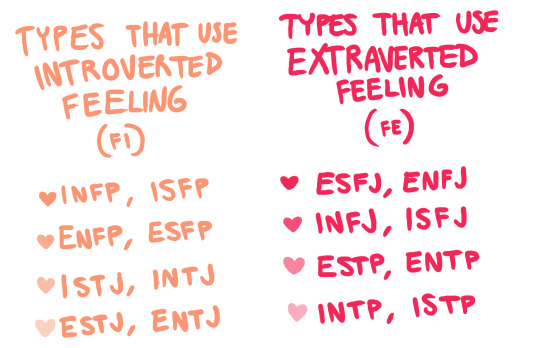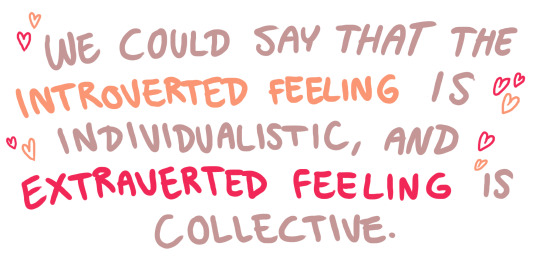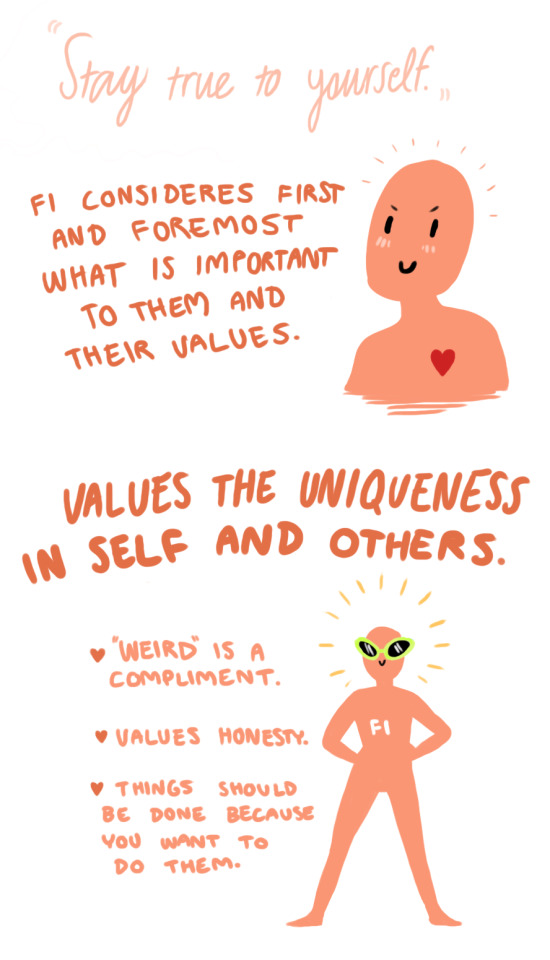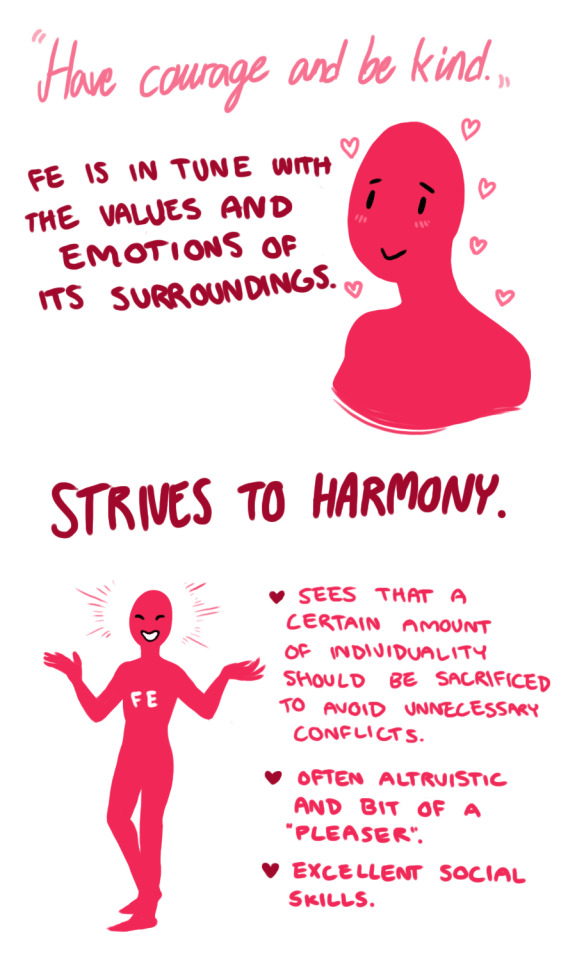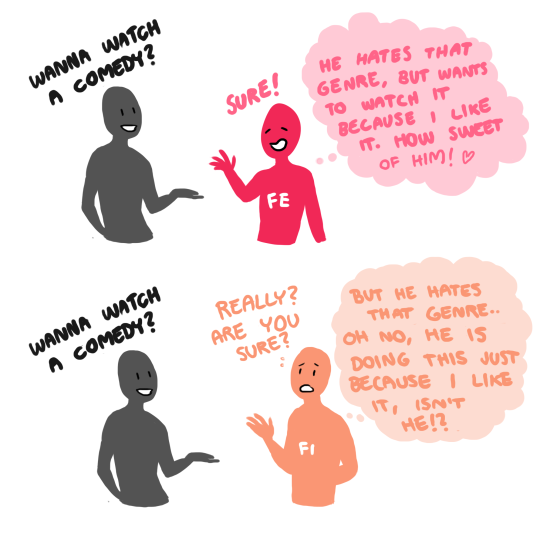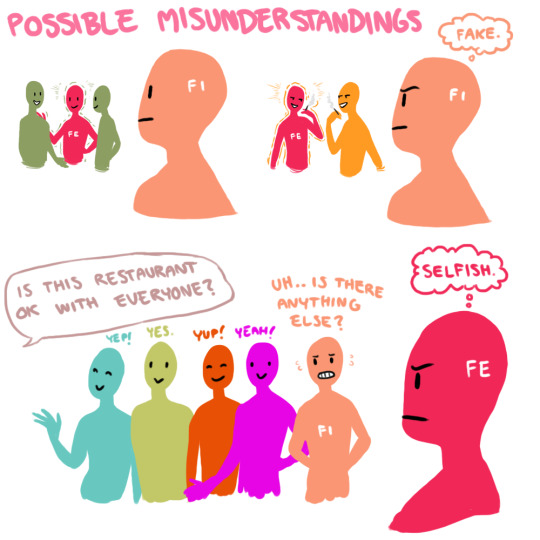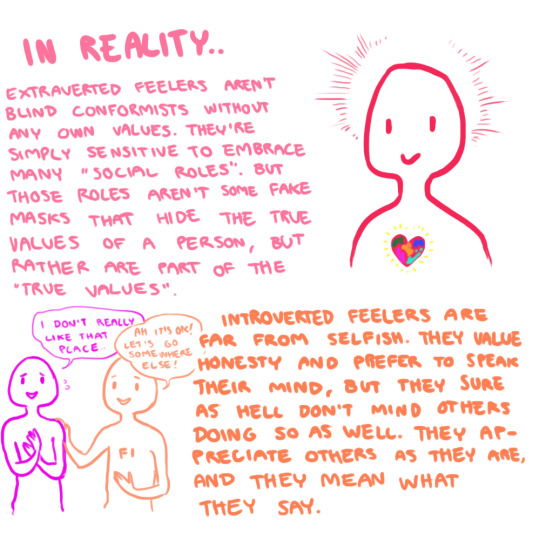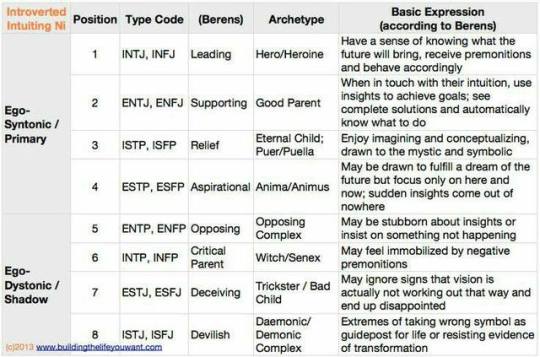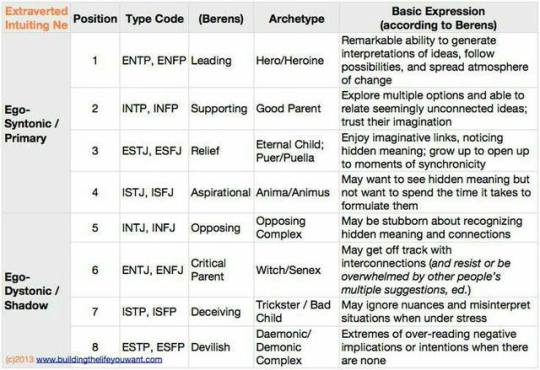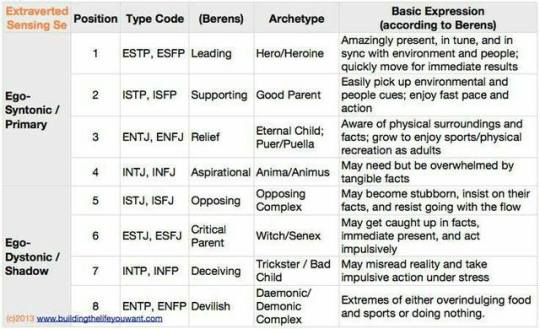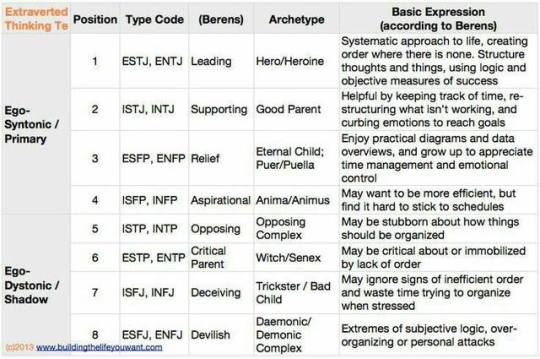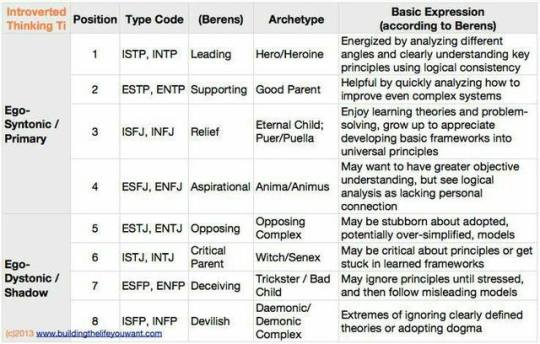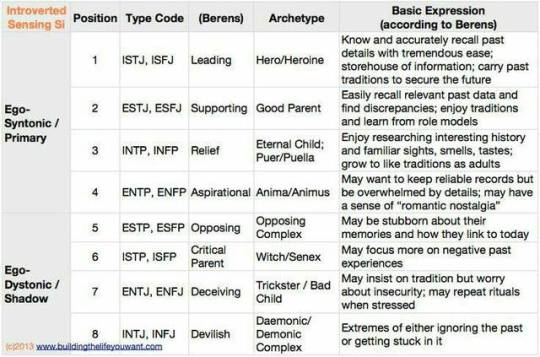Ni-Fe-Ti-Se infj journal | thoughts | memes | helpful info
Don't wanna be here? Send us removal request.
Text
MBTI & gift-giving
ESTJ: You think they will be working too much and not care about gifts so you don’t expect much. But surprises you with very thoughtful and useful things that make your life easier.
ISTJ: Will remember certain details about you that you don’t even remember yourself. Did I say that I needed a hammer last week? Well, I guess I have one now. (It will be a very reliable hammer too. Probably last a life-time.)
ISFJ: Will shower you with things that you said that you liked. That small elephant lego set you saw at the shop last week? That really scrumptious cake at that coffee shop you go to a lot? The 12 different types of candy apples? You will get them all! (And wrapped in a nice package with cute personal notes) Even if you were exaggerating and probably lost interest in those things a long time ago.
INTP: Will be very observant and precise about the thing they give you. Wow! That’s exactly what I wanted! How did you know? It will make complete sense in the end. But you didn’t realize that just hours ago they were hardcore debating if they should just give you something they gave you before that you liked or something completely new and innovative that risks it all. It caused them great distress. But you won’t see a trace of this on their calm face.
INFJ: Will overthink through all the meanings and implications of the gift they give. Will probably research to make some connections and get the creative juices flowing. May insert inside jokes and puns. All about the symbolism. You will be either completely puzzled by the gift or think it’s the most thoughtful gift you ever received.
ENTP: Will likely make the gift themself. Will take it as a challenge to make it as wacky and creative as possible to break new gift-giving ground. Probably partially a prank and a joke. Think of April Fool’s. They were sniggering as they were imagining how you will react to the gift. Highly possible that they will bail on making the final product but pushed to finish by a xNxJ last minute.
ENFP: Will think of really cute ideas of the gift. It will be hand-made, most likely. It will involve some kind of punny, witty or silly joke. Probably had a ton of fun making it. May switch ideas mid-way and get anxious. But they will finish and hand to you proud and brightly. You will smile at the cuteness and/or silliness of the gift.
INTJ: Will have trouble thinking of a gift but will put all their mind to it. What is the perfect gift? Will think of implications of the gift and all possible future consequences. Will order online super in advance. May even go to the physical store to interact with humans if they cared enough.
ENTJ: Will have little idea of what to get because they haven’t paid attention to such things. Will get frustrated with the whole ordeal but still wants to do a good job. Likely get other people’s input and have someone go to get the gift while they are at a strategy meeting.
INFP: Will find a very fitting gift that is both sweet and considerate. Likely hand-made. Will spend more time writing a thoughtful note and cute drawings than the physical gift itself. You will be all “awww”-ing through the whole process.
ISFP: Will catch your aesthetic and focus on things that will suit your appearance and needs. You are surprised at how much they have been watching and listening. Wow, I do look nice with those colors! The note that comes with it will likely be short since they aren’t so good at expressing their feelings.
ESFP: Will be an aesthetically-spectacular gift. Your five senses will be wowed to the max. They will probably be all pumped and peppy about giving it to you too. They may do really spontaneous actions in front of you like singing or dancing. They probably got an impromptu party started just for you.
ESFJ: Will give you a gift that makes you feel warm and comforted that reminds you of home. Probably planned a party down to the last detail but ESFP didn’t get the memo and takes the spotlight last minute. Womp womp high-key pissed but will be nice and civil on the surface.
ISTP: Will help you fix things in your house or your car as a gift. Couldn’t muster up the words to write a nice long note. Probably just wrote: “You are pretty cool.” You notice a bunch of failed notes in the trash. Aww at least they tried.
ESTP: Will take you out on the funnest, riskiest adventure you’ve ever had. They didn’t get you anything else but will shower you with compliments and how great you look. You will be embarrassed at how flirtatious the compliments are.
ENFJ: Will give you a really thoughtful and helpful gift. In fact, make that 10, no, 20, wait, a LIFETIME SUPPLY of girl scout cookies?! Ok, maybe not that dramatic. But surely, their gift is sure to make you feel special. It will likely be a lot of hugs and affirmations too.
24 notes
·
View notes
Text
Ni and Feeling
Ni and Fe: I can see a better future out there, a future where there is no more pain and suffering, where people can love one another and come together in peace. Somehow we can make this future a reality if we try, I just know it.
Ni and Fi: DON’T HOLD ME BACK. THIS IS MY OWN HELL.
123 notes
·
View notes
Text
Unhealthy dominant function vs. Inferior function
SUBMITTED by anonymous

I find that often, people describe unhealthy dominant functions and “natural” inferior functions in completely interchangeable terms. For instance, I heard that whether you have unhealthy dominant Se or inferior Se, it’s essentially the same thing: You’ll recklessly lose yourself in sex, drugs and rock and roll pleasures. I think it’s a little bit more nuanced than that. An unhealthy dominant function means the person has issues, either self-esteem or self-awareness, whereas inferior functions is what all of us, no matter how normal and confidn,t just struggle with. It is like our natural enemy so to speak and it can take a lifetime to embrace properly.
Unhealthy dominant Si: Super narrow-minded, does not want to step out of their comfort zone and entertain new ways of seeing or doing things. Judges and dismisses harshly whatever is uncommon to them as crazy.
Inferior Si: Difficulty retaining details and facts in the everyday sensory world, twists them around and insists on remembering things their own subjective way. Feels like sticking to sameness stiffles freedom and creativity. Difficulty to commit despite having a clear “Let’s do this!” attitude initially.
Unhealthy dominant Se: cannot for the life of them think two steps ahead, preferring to live all “Carpe Diem” at a hefty price. Unnecessary risk-taking and recklessness. Will try to squirm its way out of every bad situation rather than sitting back and thinking it through.
Inferior Se: Difficulty keeping up with the world around them, letting loose and testing physical boundaries for further exploring. Prefers to isolate in their minds rather than to give in to the moment and benefit from simply going with the flow.
Unhealthy dominant Ni: Has a bad case of superiority complex, thinking they just understand things better than everyone else. Stubborn in their ideals and refuses to budge when new information in the physical realm presents itself.
Inferior Ni: May display delusional and grandiose thinking “I can make it BIG with this simple thing…” Can turn gloomy when life circumstances don’t go their way.
Unhealthy dominant Ne: Can’t stick with anything for more than a day, contradicts itself by the end of an affirmation. Thinks everything established is played out.
Inferior Ne: May conjure up all the the worst-case scenarios and be overwhelmed by anxiety as a result. Feels it needs to re-evaluate everything it has ever believed in when things change. Slow to adapt and process new data.
Unhealthy dominant Fe: Expects everyone to cater to them. Only wants to hear what it wants to hear. Sacrifices too much for others, demands constant attention and validation. Publicly ostracizes those whom they don’t have affinities with.
Inferior Fe: Difficulty tapping into the emotional atmosphere, states its thoughts very roughly and feels like they are not so much offending as they are simply laying out logical facts that in their minds, everyone should logically agree with. May become melodramatic or angry when dealing with emotional issues.
Unhealthy dominant Fi: Does and says whatever they please because that’s just….who they are, yet will complain that no one understands them. Acts irrationally because their mind as twisted it into being the “right” to to do. Refuses to take personal responsibility when things go south as they were just being authentic and sticking to their guns.
Inferior Fi: Prone to repressing emotions and personal needs as they see it as a sign of weakness. Loses themselves because of too much emphasis on results and profits. May absolutely break down when in a vulnerable state, denying it ever happened shortly after.
Unhealthy Dominant Te: Bosses people around, shouts out judgments and criticism. Harsh and often belittling towards others. Prone to denying mistakes and shifting blame onto others.
Inferior Te: Thinks that all of a sudden they just know what makes the most sense. Can go into control freak mode. Oversimplifies things when it comes to dealing with ideas or concrete reality. Tells others off when they are offended and feel no need to apologize for it.
Unhealthy dominant Ti: Thinks they are smarter than everyone but can’t actually put their money where their mouth is, preferring to just dissect arguments from others endlessly, often for their own petty pleasure. Cynic and lacks empathy towards others as a natural defense mechanism to avoid their own emotional shortcomings.
Inferior Ti: May have emotional outbursts and lash out at others in anger thinking they are just stating facts and truths as they understand them. Tends to act as though something doesn’t bother them when in actuality it kills them inside. Convinces themselves that they are being rational when in fact they are at their most emotional peak. Cannot judge anything without feeling personally involved.
739 notes
·
View notes
Text
Enneagram
Little Things the Types Do That May Annoy Others
1- They may unintentionally cause those around them to feel hyper criticized, those close to them may feel that “nothing is ever good enough for them” but for them it’s just under the guise of, “I’m making it better, I’m just helping point out the flaws in this so you can improve it.” While others can see it as, “I’m excessively targeting your weak points and always nagging you on them.”
What people should understand: They’re just as critical of themselves as they are of you. You may feel that you’re always being forced to meet expectations that are way too high. Truth is, you don’t even need to try to meet the expectations, it’s nothing to do with you, they’re not targeting you, it’s just their style- so you can relax, and every time they point something out, you don’t need to rush to meet that expectation, cause chances are, the second you complete it, they’re going to have something else to say, and it’s not that they’re criticizing you, it’s just the way they’re ingrained, strive to be good.
2- They may cause others to feel they’re overbearing, too sensitive, overwhelming, smothering, blatantly needy. It may feel very invasive to others. They’re helpful, but when they feel that people don’t need them, they’ll do the opposite of back off and kind of throw themselves at them, waiting at their beck and call, making themselves feel worse and worse but the worse they feel the more they’ll do, which is very opposite and it may cause confusion from others and annoyance.
What people should understand: It doesn’t take much to satisfy the 2. Although it may seem like it, the two throwing themselves at them to help, lingering around, it seems like they’d want something back, something big, although they may not be able to figure this out because the more they withdraw the more the 2 approaches as if there’s a huge debt lingering for their help. Truly, all you need to do is acknowledge them. A thanks, a smile, a hug, be open to them, don’t be closed off or cold, don’t be curt and dismissive, this causes the opposite. The two wants to connect, so let them. Emotionally engage them, chat for a bit, and the two has their acknowledgement and appreciation for what they’ve done, the throwing themselves at you thing is just, the more you back away the more they’ll approach because you seem distant, and they just want you to acknowledge their help, so they feel appreciated.
3- People close to the 3 may feel that they have an all or nothing attitude. “You’re only worth something if you are something.” They may place a lot of worth on anything, academic achievement, athletic achievement, etc. There’s no place for the regular people here, you’re either a winner, or you’re with the loser. This may put a strain on those close to them, and they may accidentally cause those around them to feel that they are worthless, or that the 3 views them as underachievers when really, they just have no interest in achieving those same things the 3 has.
What people should understand: The 3 has a focused viewpoint, and the 3 should also understand that not everyone is going to share this viewpoint. Their friends or family aren’t “lazy” or “underachievers” because they don’t place the same value and importance on recognition and achievement as the 3. The 3 may feel that they are motivating those close to them, calling them to action! Motivational speeches, get off your bottom and get up and become something! To the 3, it’s motivational. To others, it may have the opposite affect, people may feel that the 3 is saying you’re worthless until you are something, or you’re not trying hard enough, or you want to be just average, you could be great, when someone truly could be trying their hardest, or maybe they don’t just place the same value on achievement as the 3. The 3 feels they’re being motivational, trying to drive those around them to action, but to others, it may not feel that way.
4- Those close to them may feel that they are self absorbed (in a negative light), obsessed with being miserable, “special snowflake syndrome” , loving sadness too much and clinging to it even in the face of possible happiness because of the odd pleasure they draw from their misery. They feel that the 4 blatantly rejects good things, in favor of basking in the melancholy they’ve cultivated.
What people should understand: The 4 often cultivates emotions, as parts of their personality. Hence, the misery example. To them, the unhappiness, is not a state they can change, it is an ingrained part of their personality. They feel that they are lacking an identity, so to make up for this, they have a large range of emotions going on for them, and they pick and choose those emotions that they decide will make them up. The 4 feels inherently misunderstood, the loner, the reject. They tell themselves that no one will possibly understand them, and they take that perspective, “I am unique, I am difficult to understand and it’s great because I’m one of a kind, but I also feel flawed, because I’m not like the others, I don’t fit in as easily.” They have a great emotional depth, but also feel somewhat empty. Cultivating feelings such as melancholy helps feel that they’ve created an identity. They long for something, but they don’t really know what they long for, in basic, they love the longing itself. They’re not really attempting to cling to unhappiness, they feel that it is a built in construct of their personality and to let go- what will happen? They’ll lose their consistency, their stability- and so they hold onto that because it’s what they’ve created for themselves as an identity.
5- There’s one thing in particular that I’m going to acknowledge, having done it myself, but I’ll throw in a few others as well. People may feel that the 5 is insensitive, closed off, inconsiderate, blatantly doesn’t give a fuck, also self absorbed, cares more about what’s in their head than the people close to them. and also, gets carried away with their little analyzing and “experiments”. I’m actually going to talk about this. We’ll call this, “Mad Scientist Syndrome” and I’ll tell you about it right now.
What people should understand: The 5 actually is sensitive, deeeeep deeeep down, and insecure, and because of that, they’ve created a barricading wall of information and mastery of whatever particular interest(s) they have, to compensate for them feeling like the world is too much, and it’s like, “ok when I’m done accumulating all this data on the world I’ll go out in the world and I’ll survive bc I know so much now” except they don’t get to the stage of “I’ll go out into the world” they’re stuck at, “Need more data” cause they’re fooling themselves into believing that they’ll only be able to brave the scary world once they know enough but they haven’t learned that you can’t replace direct experience with a mental construct, but they try to, oh we try to. Anyway, basically, behind this huge wall are their emotions and care for you, they’re don’t not care for you, and on the surface they seem oblivious or indifferent to your existence but deep deep down behind that barrier they <3 you with their secretly sensitive souls. If you ask them though, even if you don’t feel like it, it’s rather simple really, if you feel that they don’t care about you at all, it’s blatantly obvious, if we really didn’t give a fuck about you we wouldn’t hang out with you or speak to you, even if we don’t say we love you, why the hell would I associate with you if I don’t give a fuck about you? Like it’s that simple really. They can also seem snappish and inconsiderate, it’s not intentional, they’re just not aware that people will take their brusque personality personally, because of how ‘absent minded professor” they are.
Now, the “Mad Scientist Syndrome” (Sorry I know 5 is seeming really long compared to the others, wasn’t intentional, just as a 5, I have a lot to add on.) When a 5 gets invested in analyzing someone, they get impersonal. Very impersonal. Leads to them doing asshole-ish things without knowing. Sort of like how mad scientists start running crazy experiments and get all insensitive and evil and lose all morality. Okay, this is that, on a much tinier scale. Sometimes, analyzing someone’s behavior, while it is objective for you, it’s not objective for the person you’re analyzing, and it’s inconsiderate to turn them into a project. I often forget that. Please remember that, 5′s. Just like on Nemo, Fish are friends, not food. People are friends, not projects :) Please keep in mind. Also, for people, this isn’t personal it’s just this compulsive thing and it’s not intentional it’s an asshole thing to do, but I forget it’s an asshole thing to do, and it’s not a personal target either, it just happens and slips out and I’m like oh shit oops, so keep in mind.
6- People close to 6 may feel that they are suspicious, convoluted, distrustful, accusatory, pushing people away, overall complicated. Extremely indecisive, anxious, and explosive. 6′s are the picture of, “feeling an emotion vs. acting on that emotion.” Type 6 really portrays the difference, because there could be a hair trigger, and they act on an emotion, which can be frustrating for others, sometimes acting on it before they even decipher if it’s “normal” (I would’ve said rational for the emotions except emotions aren’t rational at all, but usually an emotion correlates to a situation and some emotions are abnormal to situations, take anger at someone buying you a cake or something like that, although that’s vastly exaggerated.) Basically, before they decipher the emotion they’ll act on it which can cause people to want to bash their skull into a wall.
What people should understand: 6′s have somewhat of an inherent inner turmoil, this broiling anxiety and feeling of instability. They seek outer sources to quell this anxiety and bring stability to balance out the instability they feel inside. They often “test” loyalty, to see if you’re really going to support them and this is very important for them. They may act on an emotion before actually realizing what it is exactly they’re feeling, and it’s not intentional, and they’re not attempting to start an argument, while it may seem that they’re consistently seeking out conflict, they’re actually consistently seeking out your reassurance that you’ll be there for them even in their worst moments, although it’s definitely an odd way of showing it. They know they can be difficult, and they want to trust that you’ll remain in difficult times, and because of that, they often test you, grating on your patience, and when you get fed up of this behavior, they see it as you proving that you really won’t support them. They react, and they don’t want you to react back, they want to trust that you’ll be there, in spite of their reactions.
7- People may feel that 7s never focus or refuse to focus, have a lack of direction, refuse to meet their potential, are too busy chasing fun instead of applying themselves, and disorganized, and running from any obligation or responsibility at all times.
What people should understand: 7′s are versatile. While you may believe your 7 is lacking direction, and should focus, a 7 forced to focus on one thing for a long time wilts. They get bored, and antsy. 7s may seem scattered, but truly, they thrive when they’re allowed to explore, and as they’re moving, they can definitely be successful on the go. Different things at once are exciting for a 7, they’re new, and they’ll keep on pursuing new experiences. A 7 can actually, be responsible, while still being exploratory. They’re quite smart and they’ve got quick minds, which makes them excellent at navigating and jumping from situation to situation with ease. Just because they don’t focus on one thing at once doesn’t make them less successful or intellectual- their minds are very quick, while they wouldn’t prefer to pore over a text book, if they hear a few interesting facts here or there, they’re sure to remember them and spit them out. Although, I feel that 7s may have difficulty in school, and not necessarily school itself, but schoolwork, such as homework, in school it’s a structured environment which gives them no choice but to focus, but on their free time they’re likely to procrastinate away instead of focusing on writing an essay they find boring.
8- People may find 8′s overbearing, insensitive, overtly aggressive, abrasive, confrontational, and controlling and for females they might find them “overly masculine” and I dare you to say that because a female is a type 8, or just in general because she’s tough and stands up for herself, that it’s “off putting” and I’ll fuck u up myself m8. Anyway, they may come off a bit, strong, and intimidate others.
What people should understand: The 8 intimidating others is almost a challenge, and when you stand up for yourself, it’s like an unspoken truce of respect. They’re aggressive so they don’t get taken advantage of first. Offense instead of defense. “I’ll intimidate you first so that you can’t intimidate me cause you;ll be too intimidated.” It’s an unspoken show of power and dominance, I rule, don’t try to take advantage of me. They also don’t want to show any weakness, so the show of dominance and yadayadayada, so that you can’t see their weak spots. Underneath it all, they are very vulnerable, which they’ve covered with a facade, the 5 covers their vulnerability by disconnecting, the 8 covers their vulnerability by creating a facade of toughness over it. They reject others before they reject them, and go about with the tough loner attitude, and in attempting to cover up their vulnerability they become distanced from their emotional connections to others, which can lead to controlling behavior, blatant obliviousness to the emotional states of others, and insensitivity.
9- People may find 9s procrastinating, a bit too relaxed and passive, not speaking up even when something obviously isn’t okay or just letting it slide (An example, a kid does something bad in school, calls home, mom says nothing about it, and just lets it slide, dad comes home, gets angry that mom didn’t react, yadayadayada) Not voicing their opinions until later, holding things in until it explodes in 50 years worth of anger, yeah.
What people should understand: 9 wants to avoid conflicts at all costs. They don’t want to disturb harmony or cause inner turmoil, and they won’t take the slightest risk of disrupting harmony in favor of keeping the peace even in unfavorable situations, causing them to remain very passive and perceived as lackadaisical. They’ll also refuse to make a choice that they feel might disrupt the order until they absolutely have to- procrastinating and putting it off until they have to deal with it. With their other problems, they shove them in the corner, because they never really have to deal with them, so they’ll keep procrastinating on them until they’re forced into action. The 9 isn’t lazy, they just don’t want to take even the slightest risk of disrupting the harmony and everyone’s peace of mind, so they’ll avoid it painfully unless they’re forced to acknowledge the elephant in the room.
4K notes
·
View notes
Text
Journal 2.25.18
Hmm recently I’ve had many panic episodes about my future. I guess because I’m at a hard place starting my career and going back to school.
I’ve also been really lonely because family isn’t around and I’m finally starting to feel the full weight of being by myself. I’m mentally drained and don’t have much motivation to do anything besides going to work. I’m trying to hang out with people more and build relationships. It’s hard because I’ve neglected them for so long.
I think I’m still in an existential crisis because reality is catching up quick to me and I’m overwhelmed. I think part of me still rejects it and wish that I live in a different world/universe/planet.
I think I’m not seeing the possibilities and potentials in this world so I’m kinda demoralized. Being a ni dom that is not healthy makes this state very draining. I’m trying to think of other possibilities to cope. I wish I knew of better coping mechanisms.
Maybe I’ll do an ask on some other infjs site or some active mbti help. The problem is likely larger than functions and I’ll have to work through it that way too.
1 note
·
View note
Note
Do you know How to become more confident and more productive ?
The more fears you confront, learn to manage or fix, the more confident or self-assured you become. This is because there will be less weaknesses or insecurities to hold you back. Likewise, the more in touch you are with your needs and values, the more you will focus on your interests and become more productive; by doing that you will deal with less distractions because you know what your priorities are and won’t waste time anymore.
Both require self-analyzing as well as determination and hard work to build better habits and self-discipline. In the process you also improve your skills and make use of your other qualities so it’s a constant growth that sets you into the mindset you want.
46 notes
·
View notes
Note
Hello! I’m an ENTP, and over the past year or so I’ve noticed my general energy and enthusiasm for life has steadily declined. I tend to get lost overusing my Ne to consider pointless, fictitious scenarios rather than paying attention to what goes on in real life. I would like to regain some degree of passion and have more energy. I realize that with dominant Ne I will always be a bit distracted, but I feel like my lack of energy to do ANYTHING is unusual. Any advice on breaking the funk?
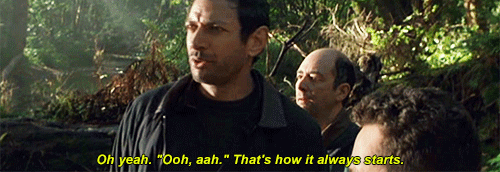
Oh gosh.
This is a problem all the ENXPs I know (myself included) struggle with a lot, but I’m not sure what causes it in each of us rather than inertia and … laziness. See, Ne is the easiest function for you (and the rest of us) to use, which means taking your ideas and making them reality requires lower function interaction… that often involves hard work / analytical skills / follow-through… in other words, thinking functions and inferior Si.
This same inferior Si can cause issues by making you get stuck in a rut, fear you are wasting your life, not living up to your full potential, or that life will never change – the non-creative times in your life will cause you to fear the fog will never left, that you will fail on epic levels. The imbalance between Ne (new and exciting possibilities and ideas) and Si (learning from past mistakes and attending to details) can be… bad.
The myth that Ne-doms never do anything or finish anything is a stereotype; light a big enough fire under a Ne-dom (by choice or necessity) and they can and will get projects done, out of their own desire to see their ideas brought into the real world – that’s a healthy Ne-dom in action: make my ideas real.
Typically, Ne-doms find energy in something they feel passionate about – if you have steadily experienced a decrease in passion over the last year or so, it means somewhere along the way you lost your idealism and/or enthusiasm for whatever you were aiming toward. In other words, maybe you were going to medical school and all excited about that and found out a year in that it’s hard and detail-driven and you don’t like it near as much as you thought… so your passion waned and your energy alongside it.
The cure is to find something that energizes and excites you, which can push you to pursue it with energy instead of lapsing into dreaming and not doing.
A couple of things to remember, in general:
How you start your day matters. Your brain is a computer that has a limited amount of time to boot up in the morning – and how you choose to let it boot up will impact its mental coherency for the rest of the day. People who hit the snooze button and enter a half-sleep cycle fight lethargy the rest of the day; people who choose not to engage their mind and set a mentality of ‘start work’ find it harder to stay focused or get motivated; but the people who get up promptly and create a plan for the day often get a lot done.
When I heard about this, I legit thought that it was idiotic, so I decided to test it over a couple of weeks and monitor my mental process. The days I get right up and do something productive (write reviews, answer e-mails, even write on a book), I feel more alert / motivated for the entire rest of the day; and the days I lay around in bed, only chat with my friends, or watch Netflix before breakfast… forget it, I often have to ‘force’ myself to take action the rest of the day.
Set reasonable goals and reward yourself. If you have nothing to look forward to on the other end, why do it? Give your mind and body what it wants – something beyond a sense of accomplishment.
Exercise. N types tend to think a lot and move not so much. If you lack energy, exercise… it will build your stamina and give you more physical energy. :)
Good luck!
- ENFP Mod
76 notes
·
View notes
Note
Can you do a post on how narcissism effects each type

“Narcissistic personality disorder is a mental condition in which people have an inflated sense of their own importance, a deep need for excessive attention and admiration, troubled relationships, and a lack of empathy for others. But behind this mask of extreme confidence lies a fragile self-esteem that’s vulnerable to the slightest criticism.” [x]
NTJ: driven to prove themselves through sheer intellect and superiority in ideas to others, often devalues humans / relationships other than how they serve the larger agenda or vision; makes decisions beneficial only to self, without concern for emotional collateral damage, and actively targets anyone who threatens them; may have Ni-driven issues with distrust / paranoia; ENTJs will be more attention seeking through tert-Se behaviors; INTJs will place greater emphasis on their own needs / wants / beliefs through tert-Fi.
NFJ: manipulative and attention-seeking through Fe, driven toward a singular idea, often attacks others on emotional levels to distract from their own lower Ti insecurities; can be competitive, argumentative, and paranoid (high Ni issues of distrust and projection of self’s motives onto others). ENFJs will be more aggressive in keeping up false pretenses and in defending their ego; the INFJ will place more emphasis on their ideas and see themselves as a visionary and/or suffer from a savior complex.
STP: flashy and impulsive, inclined to show off with a Se-driven desire to be ‘the best’ at everything; can be charming and manipulative through Fe, but often cold and aggressive in dismantling or attacking anyone who threatens their false self; may believe themselves far more wonderful / important than they are, and, if in power, force others into subservient behaviors around them, to flatter their ego. ESTPs will be more aggressive and reckless than ISTPs.
SFP: may focus on appearance in connection to their narcissism, and believe themselves worthy of ‘the best’; suffers from a lack of true Fi (concern for others, value of individuality, compassion, ethics, etc) in favor of entirely selfish motives and behaviors; uses tert-Te to dismantle enemies in quick methods. ESFPs may be more aggressive in pursuing ambitious activites and putting themselves in the limelight; ISFPs may have lower Ni paranoia issues.
STJ: extremely hard working and competitive, with a strong emphasis on self-identification through work; often devalues humans / relationships other than how they serve the end result ; makes decisions beneficial only to self, without concern for emotional collateral damage, and actively targets anyone who threatens them; ENTJs will be more dominant and may over-exaggerate the value of their tert-Ne unique ideas; an ISTJ will place greater emphasis on their Si-dom capabilities and attentiveness to detail.
SFJ: often excessively focused on how others see them, but unlike real Fe, cares only in as much as outside affirmation serves their ego; bonds only to manipulate, may underestimate their own motives; may actively take ‘possession’ of people in their life, and fail to separate them from Self (a parental attitude taken to extremes, where everything comes back to the SFJ’s sense of betrayal / anger / etc); ESFJs will seek more to control others, ISFJs will want acknowledgment for their steadfastness.
NTP: considers themselves, their ideas, and their intellect as superior to everyone else; uses Ti to deconstruct others’ arguments and Fe only to manipulate; aggressively seeks external affirmation, jealous of positive attention to anyone else (especially in their levels of intelligence), unable to analyze themselves or see people as existing except to please / flatter them. ENTPs will be more aggressive in demanding attention than INTPs, who may consider themselves immune to outside influences and/or place more emphasis on their Ti-dom cool detachment rather than Ne-theories.
NFP: considers themselves, their ideas, and their opinions as superior to everyone else; lacks true Fi (compassion, respect for individuality, etc) in favor of an inflated sense of personal importance / has total confidence and no guilt in doing whatever they feel most benefits them or achieves their goals; places much emphasis on their intelligence and ability to ‘read people’; the ENFP will seek more actively external affirmation and praise, and attack anyone who threatens them with tert-Te tactics; the INFP will consider themselves ‘above’ the rest of humanity and live separate from them, in their own world.
- ENFP Mod
534 notes
·
View notes
Text
Hmm gotta read on this later
SOME BASICS ABOUT PSYCHOLOGICAL TYPES
1) WHAT IS WRONG WITH THE MBTI AND THE “FUNCTIONS”
1.1) ALL THE “FUNCTIONS” FOR THE INTROVERTS ARE WRONG
It seems nobody can spot the difference between the introverted “functions” that Jung described and the current absurd mythologies that get attached to them. Because everything that you can read online about those “functions” (and most of the extraverted too) is wrong. And it seems nobody can recognize the actual correspondence between the introverted types in real life, the people that we supposedly know, and the ones that appear in Psychological Types.
I don’t know what’s the cause of this, but it might be that somebody read the descriptions and didn’t like what Jung had to say about some types, probably the introverted rational ones. Some people started thinking about themselves and/or talking about those types as if they were some of the perceivers, because of their less threatening nature, perhaps. Introverted feelers say, for instance, that they are “dreamy”, or “misunderstood”, or something like that. Introverted thinkers may say they “love history”, lament that others don’t take their advice, etc. They are all “attuned to their senses” or “their intuition”, etc. I’m sorry, but that’s only the self-marketing language speaking, not a pscyhological analysis. It’s all costumes and masks, in some kind of parade where everybody wants to be “special” (that is: marketable). At this point the language is so twisted up, that those words, and the types themselves, can mean anything.
Now, just for the sake of trying once more:
Do you really think INTJs/INFJs are the kind of people that a serious psychologist (not a Shakespeare) would describe as the artistic dreamers, misfits or cranks of society? Are they the “great men gone wrong”, whose arguments tend to lack conviction and nobody understands, among all others? Are ISTJs/ISFJs indifferent to their surroundings, or have some kind of mythical screen between the real things and their own perception? Do you really think their inner essence could be described as “calm”? Would a psychologist say ISFPs/INFPs’ reactions to the object have a negative character? Is it really so that they don’t join others’ emotions, but instead try to cool them down? Do you really see those types as driven, and sometimes a bit paranoid? Are INTPs/ISTPs really the most “scrupulous”? Do they show a tendency to complicate themselves, and do they actually pay that much attention to detail? Do they give the impression of believing in some kind of superstition?
No. Jung wasn’t writing his first impressions about a bunch of random people. He wasn’t doing a “first thing that comes to your mind” exercise. His depictions were the result of years of professional practice on all kinds of people, and the evaluations he used were placed in their right positions along a wide spectrum. So it’s the most scrupulous that gets called that, not the one that might be a little bit scrupulous from time to time, or someone that’s trying to market himself as scrupulous in a job interview.
It’s the INTPs/INFPs (Ni1) that get lost in useless fantasies. They are the weird ones. But not the weird ones on television or the media. That’s not a faithful reflection of the spectrum of real people. They are the real weird ones, not the famous [extraverted] “lunatics”. This is so obvious that I don’t know how anybody can read Jung and think otherwise. It’s almost as if nobody actually reads what he wrote. It’s the ISFJs/INFJs (Fi1) that have unreachable visions, the ones that develop hidden intense feelings and sometimes imagine what others are thinking. They are the ones with a “mysterious power”, the ones of sudden and heroic gestures. The scrupulous ones are the ISTJs/INTJs (Ti1), the ones that complicate themselves, and often others. They are the ones with the uneasy amiability, the ones that really seem to be worried about any lack of control. And the calm ones are the ISTPs/ISFPs (Si1), the ones that take their time to tinker and get lost in their own perception of things.
1.2) THE AUXILIARY IS WRONG FOR EVERYBODY
Myers measured J/P just as Jung would think about rational/irrational types, but she thought she was doing something different. No, Liz, dear. You can’t be “rational inside and irrational outside”, that’s not how it works. You are always one of those, everywhere, as a default state or “natural essence”, and you seek the assistance of the other only in particular moments/things/tasks/ideas, to help your true foundation, which is at all times “running in the background”. You can also picture this as one inside the other.
The most important thing in Jung’s work is the opposition between introversion and extraversion. If you really want to understand what he was trying to say here is another picture for you: those two attitudes as opposed points of attraction, and the contents of the mind starting at the center and then sliding and placing themselves more to one side than to the other, in pairs of interrelated but opposing elements. The first things to move from the center are the conscious of the person, that goes to one side, and the unconscious, that goes to the other. If the conscious goes to the extraverted end we have an extraverted person, if it went to the introverted one, we’d had an introvert.
The degree of self-clarity between the contents and workings of the mind (along this imaginary line between those two points of attraction) is what Jung called “differentiation”. At this moment the main form of the conscious/unconscious are two “functions”. These can be Thinking/Feeling or Sensation/Intuition, either in that order or backwards. The conscious one (let’s say it’s Feeling) is indistinguishable from the way the subject “experiences” life/himself, making it harder to be identified than what’s usually thought. This is what’s called the “dominant function”. The unconscious one, in this particular case, would be Thinking, and it could be called “unconscious dominant” (Jung called it “inferior”). One is introverted and the other extraverted. Always.
In some people this is the final stage (the ones Jung mostly described in his book), but in others a second element gets caught in the attraction of one side, sending its opposite to the other. These are two more “functions”, called “auxiliary” because they help the dominant ones. In order to be helpful they must be the pair that didn’t move in the previous stage. In the case of our Feeling type they are Sensation and Intuition: one would go help the conscious Feeling and the other the unconscious Thinking (two possible combinations, then). The “poles of gravity” in the mind are introversion/extraversion, not conscious/unconscious, so the second “function” appears with the same attitude as the one that’s already in place on each side. This means that if you are an introvert everything that slides to your conscious mind will be introverted, and if you are an extravert it will be extraverted. Your unconscious gets the other part.
This is actually one of the most amazing things that Jung discovered. Introversion and extraversion are basically two different worlds, and we live consciously in one and unconsciously in the other.
The extraverted types have always had two rightly defined “functions” whenever people talk about those MBTI types through them: the dominant ones (conscious and unconscious). But their auxiliaries are wrong in the minds of lots of people. So, in comparison with the introverts, they have been only half-mistreated. This means that the extraverted “functions” should be slightly better understood, but nobody is getting the introverted ones right at all, so I think their extraverted counterparts might be getting some backlash from all that misunderstanding.
1.3) ALL DESCRIPTIONS BASED ON THOSE “FUNCTIONS” ARE WRONG
I have to leave here a big thank you to reckful (aka reddshoes) for his great explanations about MBTI and typology (especially this one) (he doesn’t like anything “functional” at all, to be clear). It was reading those lines when something made click and I finally understood what was wrong with the usual “stack model” that everybody seems to repeat over and over. It’s all wrong, people. It’s aaaaaaaaall wrong. Those who took the “stack” and started making sites, and descriptions of the types, and selling books, and typing people only with that (saying the “functions” were “cool” and “advanced”), only made the “types” even more meaningless, mixing people with all kinds of real types together. Then you have those absurd ideas about “grips” and “loops”, that only magnify the seal of ignorance. Now there are so many contradictory and plainly imaginary things mixed up together in each type that currently those four-letter combinations amount to little more than amorphous collections of made-up “facts”, clichés and misunderstandings.
There are patterns of mistakes in lots of typology-related texts out there. This one, for example, is one of the most common:
Their descriptions of “Te” are actually about TJs, not about “Te” as a “function” (because, for example, ITJs are Ti1). Their descriptions of “Ti” are actually about TPs, not about “Ti” as a “function” (because, for example, ETPs are Te2). Their descriptions of “Fe” are actually about FJs, not about “Fe” as a “function” (because, for example, IFJs are Fi1). Their descriptions of “Fi” are actually about FPs, not about “Fi” as a “function” (because, for example, EFPs are Fe2). Their descriptions of “Se” are actually about SPs, not about “Se” as a “function” (because, for example, ISPs are Si1). Their descriptions of “Si” are actually about SJs, not about “Si” as a “function” (because, for example, ESJs are Se2). Their descriptions of “Ne” are acually about NPs, not about “Ne” as a “function” (because, for example, INPs are Ni1). Their descriptions of “Ni” are actually about NJs, not about “Ni” as a “function” (because, for example, ENJs are Ne2).
Again: it’s all wrong. It’s such a next-level kind of wrong that it was one of the main reasons for me to start publishing here. The thousands of books, pages, forums and blogs, the most famous and linked descriptions on the internet, the millions of posts about typing celebrities and characters and the different kinds of bricks and flavours of ice-cream. All backwards and twisted and wrong. (“But what about…?” Yes, that one too). All wrong, and basically useless. Only good for making ignorance look like complexity (as if that was some kind of guarantee), and not helping people at all. Yeah. There’s a lot of things that “work” just like that.
OK. RIGHT. SO. WHAT CAN WE DO?
2) THIS TABLE COULD BE A GOOD STARTING POINT
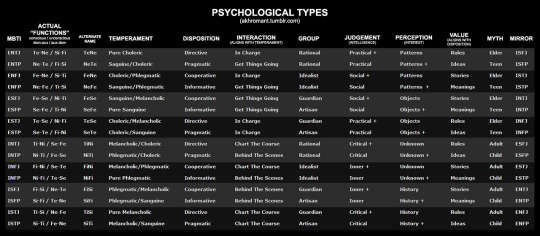
The real Jungian “functions” of each type are those that appear in this table that I’ve made. That’s the way everything makes sense. The table includes some of the categories and terms that I’ve found to be the most meaningful in almost 10 years of reading and trying and thinking and collecting information and starting all over again, on this topic of psychological types. There are lots of things that could be there as well, but I think this selection works as a good starting point.
I tried to put words that could be used together in sentences, with a little tweaking, going from one column to another, in order to find new ways of exploring the types, their similarities and their differences. Some combinations don’t work at all, I know, but others might go “click”, and open doors. Some good examples could be: J types “want to find [perception][value] for [judgement]”, and P types “want to find [judgement][value] in [perception]”. The + sign marks the main standpoint of the type, what takes precedence over everything else. It should appear (or be understood) only as the most important source AND destination.
2.1) TEMPERAMENT
I find the temperament associations (taken from the links here) very meaningful because they seem to capture almost perfectly that kind of “vibe” or “air” that comes from the people of each type. They are colorful and give the types a more tangible aspect. (I made some images trying to show this: {1} {2} {3} {4} {5}).
One interesting thing is that we have a type with a “pure” temperament for each Keirsey group, intelligence, interest and myth (see 2.3 below). That’s pretty neat. And the same can be said if we look at Berens’ “interaction styles” (link), because they all match perfectly.
And we also have matching descriptions if we take a look at Jung’s Psychological Types. About the introverted feeling people he said: “not infrequently their temperament is melancholic.” Check. On the extraverted thinker he used words such as “cruel tyrant” and “his expression and tone frequently becomes sharp, pointed, aggressive“, which could easily be how someone would describe a choleric temperament. And about the introverted thinker he writes “emotivity and susceptibility“, “bitterness“, “isolation“, “feelings of inferiority” and a certain tendency to victimhood (these last two are about both rational introverts), which are a good mix of melancholy and choleric things.
2.2) JUDGEMENT AND PERCEPTION
The words “intelligence” and “interest” here are just a guide, like the rest of the words in the table. You know they are not “scientific”, “final” or “exclusive” in any sense. That’s not how I write. Ok.
We just needed to put the right “functions” in the table to discover this correlation:
Conscious Te = Practical Intelligence (ET = cTe) Conscious Fe = Social Intelligence (EF = cFe) Conscious Se = Interest in Objects (ES = cSe) Conscious Ne = Interest in Patterns (EN = cNe) Conscious Ti = Critical Intelligence (IT = cTi) Conscious Fi = Inner Intelligence (IF = cFi) Conscious Si = Interest in History (IS = cSi) Conscious Ni = Interest in Unknown (IN = cNi)
So, yes, your conscious includes both combinations of your second and third letters with your first letter. If you are a J their order is reversed (X1 = 3rd+1st, X2 = 2nd+1st), but with a P you already have them in order (X1 = 2nd+1st, X2 = 3rd+1st). There’s a lot more to say about the “functions”, but those two-word descriptions are actually pretty good. We can make an experiment right now to see how the order matters a lot: ESFPs “would use their social intelligence to help their interest in objects“, whereas ESFJs “would use their interest in objects to help their social intelligence“.
Ok, just one more thing for now: “History” in the table means [personal] history (and things related to that), so it’s not necessarily “world history” (whatever that is). Conscious Si implies a more internal aspect of things and events, essentially “the known”, in contrast to “the unknown” (which is the realm of Ni, as the two are mutually exclusive).
2.3) MYTH
We can arrange the 16 psychological types in all sorts of ways. One of them is using the first and last letters: EJ / EP / IJ / IP, which result in four groups of four. To me these are incredibly meaningful groups: if you think about the types in each one you get a sense that they could be considered representations of four main archetypical roles that characters embody in legends and classic tales: the Child, the Teen (or Young), the Adult and the Elder. It’s not about the actual age of anybody, of course. It’s about the mythical qualities that their minds would probably acquire if they were characters in some kind of fairy tale.
The Child is the innocent bearer of strange and unmapped new treasures. He is the playful explorer that wanders and wonders at things, known or unknown. But the treasures he finds need somebody else to be recognized and applied, because the Child can only imply their existence, and he’s actually somehow aware that they can be abused or misused, so he usually doesn’t announce or lend them. The Child is often dependent in some important way (physical, emotional, economical, directional, etc). Sometimes they can be also suddenly original, weird, insolent or irreverent, because they don’t recognize customs or authority. IPs are the eternal Children. (Si1/Ni1). All Children have some kind of phlegmatic temperament, except ISTPs, the more “mature” among them, and probably the less likely to be dependent.
The Teen is the one who thinks he knows everything. He’s the one without restraint, daring and bold but also loud, reckless and dangerous. He “believes”, goes out there and tries to prove himself. The Teen likes competition and anything that he hasn’t done before. He likes change for change’s sake. The groups or partnerships that he might be part of are usually just fleeting gatherings of separate individuals, not actual established institutions. And he joins whatever satisfies him, without thinking about responsibility. He wants everything, and doesn’t understand the concept of incompatibility. The Teen takes games too seriously and work too leisurely. When something that should be mere routine goes amazingly well or terribly wrong is often because of them. EPs are the eternal Teenagers. (Se1/Ne1). All Teens have some kind of sanguine temperament. People that don’t really understand typology tend to think of [famous] Teens as being Child types.
The Adult is the dutiful one, running things at a private scale, usually in small groups, like a team or a family. It’s often an Adult that’s in charge of Teens and Children. He is always working, and making things right. Everything is a serious matter for him, he has responsibilities. The Adult is a little worried that things might go wrong, and sometimes puts up with too much. He doesn’t want anything to go to waste, or become a liability. The Adult might find it difficult to relax, but he is a solid foundation. He likes protection, involvement and development. He is ambitious in a common-sense kind of way. His results are localized, serving as a bridge to more work. IJs are the eternal Adults. (Ti1/Fi1). All Adults have some kind of melancholic temperament.
The Elder is the one running things in a public way, and he’s usually somewhat alone in his position. He is a known leader, often consulted regarding important decisions in all kinds of matters. The Elder tends to work at his own pace (not necessarily slower than the rest, so he can be impatient with others), and gets global results. He’s not actually worried, but more like resigned, or maybe somehow “possessed”. He knows a lot that can be useful, but tries to focus on some principle that he has found and considers more valuable than knowledge. It’s those principles that can “possess” some of them. EJs are the eternal Elders. (Te1/Fe1). All Elders have some kind of choleric temperament, except ESFJs, the more “child-like” and probably the most likely to be closer to younger people. I think there’s also a tendency in this case, for people that don’t really understand typology, to think of [famous] Elders as being Adult types.
This is something that I’ve been thinking about a lot lately. I like this kind of things :)
2.4) MIRROR
This would be the actual “dual” of each type, the one with the same functions in the opposite place. I don’t know anything about how they “get along”, and I’m still trying to figure out what kind of “switch” takes place between each pair, or how to explain it, but this was another problem with the usual “function stack”, another thing that didn’t make sense at all. This way it might start to do so.
—
Ok. I’d say that’s enough for now.
Look at the table. Then go away. And think about it.
331 notes
·
View notes
Note
What does unhealthy and healthy Ti looks like in all 4 positions?

Unhealthy Ti-dom (IXTP): Over-simplification of complex logical structures. Unable to see the flaws in their own reasoning because they exclude other perspectives. Ignores the human component or dismisses some arguments because they are ‘irrational’ and therefore useless. Treats human beings like lab rats, purely for their own logical development and analysis of human nature.
Healthy Ti-dom: Good at forming and analyzing systems and correcting their misjudgments as new evidence arises to contradict them; able to problem-solve and approach situations with detached, measured, and capable minds. Aware of and desirous of fixing problems / shortcomings / inconsistencies in their own thought patterns. Fond of deconstructing problems to find solutions.
Unhealthy aux-Ti (EXTP): cannot admit to being wrong, refuses to admit to making mistakes, rationalizes away criticism instead of using it to analyze one’s inconsistencies in order to improve, prone to premature judgments, arrogant about beliefs and certain of their own success, prone to believing oneself more intelligent than their peers, corrects/criticizes others and dismisses any viewpoint that seems ‘irrational’ to their mind
Healthy aux-Ti: strives for logical precision and consistency, is skilled at analyzing and evaluating choices before you make them (for ‘success’), strives to make decisions devoid of personal bias or inconsistent / unimportant info, places logical correctness and consistency before ego (can admit when wrong and self-correct, avoids making premature rational judgments, and instead allows time for careful analysis)
Unhealthy tert-Ti (IXFJ): over-thinks but makes no progress, trust only one’s own judgment and rationality (even when wrong), is stubborn and cannot admit to mistakes or correct them, believes oneself logical but cannot see the raging inconsistencies or contradictions in their beliefs or behaviors; criticizes others’ thinking while not having good logical arguments themselves.
Healthy tert-Ti: strives for internal consistency in belief systems, and careful analysis of information, able to deconstruct information and test its logic, strives to be more capable, analytical, self-critical (in addressing and dealing with personal problems / mistakes / errors in judgment and logic)
Unhealthy inferior-Ti (EXFJ): critical of other people / concepts / ideas, quick to blame or correct others, distrustful of others and doubtful of their goodness, over-depending on external sources of information, unable to analyze personal problems or relationship issues, unwilling to admit when wrong, often defensive about how ‘smart’ they are and unwilling to admit when they are wrong
Healthy inferior-Ti:a strong desire to understand themselves and others, and the ability to check one’s own beliefs for inconsistencies, to problem-solve, and deconstruct ideas / principles / analyze situations effectively, rather than relying on emotions alone
- ENFP Mod
336 notes
·
View notes
Note
Hi! I've always had a complicated relationship with my parents and have been trying to figure out why I am more volatile and aggressive towards them than literally anyone else. I have reflected a lot and resolved to try and pause whenever I feel triggered, like counting before speaking. However, it is still difficult for me to slow down before I react over-emotionally, since my behaviour comes so instinctually. Do you have any tips for remembering to restrain oneself during verbal communication?
It’s not about restraint, it’s about awareness. People of all ages and socioeconomic backgrounds ask me about problems with parents, so it is worth going into in depth. According to analytical psychology, parental relationships are often the most fraught because your primary caregivers are the main target of your unconscious projections. Projection is a very primitive defense mechanism and probably the first one a person learns in infancy (see the section on defense mechanisms).This is a very complicated issue and I cannot give a full/adequate explanation in a blog post when very thick books have been written about it.
Negative emotional states are very threatening because they threaten to activate the death instinct, which is directly opposed to the life/survival instinct. Therefore, when a person experiences a negative emotional state, the dominating life instinct demands that the negative emotional state be remedied/alleviated immediately. However, if one is incapable of doing this (as infants are), then one must find another way to cope, otherwise the death instinct may ascend and overpower the will to live. Since confronting this fear head on is not an option for a helpless infant/child, an easy way to cope with the “humiliation” of being unable to address/meet one’s own emotional needs is to project that humiliation onto an external object. Thus, infants/children treat their primary caregiver as an object whose sole purpose is to alleviate negative emotional states (i.e. approving of the parent-object when it succeeds; disapproving of the parent-object when it fails). It is common for children of any age to have trouble acknowledging the parent as a real person when they haven’t managed to transcend infantile mentality due to poor ego development and they still perceive the parent as an object even in adulthood. They will continue to project and blame the parent even though the parent is no longer the one who should be responsible for their emotional well-being.
Growing up, whatever aspects of yourself that you reject/repress get projected, i.e., you keep the parts of your experience that you like as “yours” on one hand, and then “vilify” the aspects you dislike by projecting them onto the caregiver on the other hand. As an infant (or as an older person who regresses into infant mentality), it is far safer, psychologically speaking, to vilify another person-object because: 1) Negative emotional states promote helplessness and self-vilification which activate the death instinct in infants (or shame in older people), so vilifying something else, anything else, quickly ensures a sense of survival in infants (or ego stability in older people), and 2) Even though the parent is defined as the source of your emotional comfort, it is still safe to “hate” them because you have no real power to harm them when you perceive them as being in a “superior” position in relation to your “helplessness” (but, when older, the hate can run deep enough that you do indeed want to harm them, though you might feel too ashamed to admit it to yourself). It is common for children of any age to get occasionally jarred when they realize that the reality of the parent does not match the projected image they constructed. In reality, the parent is never as good or as bad as you believe they are because they are human just like everyone else, though you treat them as the archetypal embodiment of good and evil.
Without ego development towards better self-awareness, a person never becomes aware of their primitive projections even into adulthood. A parent-child relationship can become more and more fraught over time because parents also project onto their children (e.g. pinning personal dreams on kids, being jealous/envious of kids who excel, feeling ashamed of kids who don’t excel, etc). People at low levels of ego development see their parents everywhere they look; they are easily threatened by anyone who even slightly reminds them of the primary caregiver(s), and their social interactions tend to repeat old patterns of childhood projection. It’s no coincidence that many adults end up with a spouse who possesses a similar personality to a parent. Old patterns of projection are a comfort even when they are full of drama/conflict because the drama is a reliable “ritual” that allows you to reinforce your ego boundaries through repetition of your past traumas. As much as a person complains that they “hate the drama” of dealing with family, they cannot help but continue the old patterns because they get a “reward” from it in the form of an ego boost.
What all of this means is that “personality” is not the simple concept most people think it is, it’s not just a mere collection of traits or characteristics. While people are born with certain genetic predispositions, a person’s sense of self and long term character are very much socially constructed, shaped by early social interactions in infancy and childhood. I like to think of personality as being a living record of a person’s lifelong patterns of projection. Every time you unconsciously project something undesirable about yourself that you’d rather not acknowledge onto another person-object, you deepen the outlines of your personality, you draw clearer and clearer distinctions about “who I am” versus “who I am not”, until you eventually possess a relatively solid personal identity (e.g. “I am Te” and “I am not Fi”). This process is essential and a good thing because you wouldn’t have a personality otherwise. However, personality development has two phases: The first phase is building a solid personal identity while the second phase is seeing through the falseness of that identity to reach your higher potential. Many people don’t get to the second phase and they essentially get trapped by the false identity, repeating old patterns until… death.
Being good at relationships in general (not just parent-child relationships) requires building awareness of your patterns of projection. Without this awareness: you are never able to see the other person objectively, you treat the other person as an object upon which you replay your old childhood traumas on repeat, you are easily baited into drama/conflict any time your old traumas get triggered, and you never take full responsibility for the harm that your projections wreak (opting to blame the other person for “provoking” you with their “bad” behavior, and how convenient that you get to define what is “bad”).
This hopefully goes some way to explain why parent-child relationships are so complicated, why people tend to be much more aggressive/volatile with their parents than anyone else, and also why this behavior easily transfers from parents onto a romantic partner (because the partner assumes the place of the parent as intimate caregiver). To remedy this problem is not about “showing restraint” because restraint often just amounts to suppressing your feelings/emotions in order to avoid immediate conflict, which just shifts the problem around instead of resolving it. To solve the problem for good, one must go beyond “restraint” to understand the root of why one gets all riled up in the first place.
According to the theory of projection, a person won’t bug you unless their existence threatens your existence somehow (in the same manner that the action/non-action of a caregiver-object threatens your existence when you are dependent on them for physical survival and emotional comfort). Many people believe that true emotional independence is about “not caring what others think”, which is often just callousness or self-deception. True emotional independence means that you can 1) honestly acknowledge the effect that others have on you (because humans are built to be social creatures) and 2) take responsibility for how you react to people, whether it is an “emotional reaction” or an “action reaction” or “moral outrage”. When you are bugged by someone, it is your reaction to them that needs to be examined, to understand why they bug you in terms of what unconscious aspects of your personality (i.e. old traumas) they are triggering.
When you understand your personality at this level of depth, you can eventually learn to disarm the old patterns and diffuse your unconscious emotional reactivity on the spot or very quickly, thus eliminating the need for restraint entirely because there is nothing to restrain. The pattern might never disappear entirely and you may still get triggered whenever you are not self-aware enough, but you can develop better strategies for responding to the trigger when you have objective knowledge of what’s happening. When you have objective knowledge of your projections as well as objective knowledge of their projections, you can then empathize with both sides. Empathizing with yourself isn’t about indulging your worst impulses, it’s about acknowledging the shame you feel when others trigger your infantile sense of helplessness and then, from that dark place, forgiving yourself and finding a brighter place to exist. Empathizing with someone else is not about turning the other cheek to their hurtful behavior, it’s about understanding where they are coming from so that you are able to take rational action from a place of wisdom as opposed to reacting like a wounded animal from your old buried traumas (i.e. escalating the conflict in a complicated dance of mutual projection).
Cognitive function theory helps you see through your own projections because it explains how projections work in each type. Cognitive functions that remain undeveloped are left to operate unconsciously, in which case most behavior will be driven by unconscious emotional impulses. If those emotional impulses are very negative in nature, you are much more likely to use negative and unhealthy defense mechanisms (like projection) to cope. If you’ve never learned good emotional coping mechanisms, you’ll likely just keep repeating primitive childhood coping patterns. If you did learn good coping methods, you can still regress to infantile mentality when placed under enough stress or triggered severely enough by some negative event. Generally speaking, the remedy to unconscious emotional behavior is building awareness of unconscious impulses, which is what type/function development is about. Therefore, if you hope to have better relationships:
work on developing your personality in order to build better self-awareness (see the Type Development section)
observe patterns in the way you react to people/situations to identify common emotional triggers and learn to better manage your emotional reactions (see the Emotional Well-Being section)
observe how different personality pairs use projection in their interactions with each other, and then use that objective knowledge to bridge differences and diffuse conflicts rather than escalating them (see the relationship pairings section)
As a side note, one of the main tasks of a good psychotherapist is to help the client build awareness of projections by analyzing them within the therapist-client relationship (aka transference and counter-transference).
128 notes
·
View notes
Text
Masterpost: MBTI & Relationships
Any two types can work well together as long as they are mutually supportive and aware of each other’s priorities, needs, and sensitivities.
Survey of Relationship Preferences
How Each Type Handles Crushes
Practical Relationship Tips for Each Type
Handling Differences in Relationships
Communicating Through Difficult Conflicts
Analyses of Relationship Pairings (web link)
Related Notes
On Parent-Child Relationships
On Compatibility Theories
On Patterns of Attraction
On What Each Function Seeks in Others
On Seeking Love for the Wrong Reasons 1 & 2
On “True Love”
On Receiving Love
On Trust Issues
On Hypocritical Behavior
On Manipulative Behavior
Notes on Spotting Manipulation
On What is Good Communication
On Function-related Communication Issues
On Encouraging vs Enabling People
On Cohabitation
On Pesky Fi/Fe Differences 1 & 2 & 3
On Disagreeing With People
On Political/Sensitive Discussions
On Handling Criticism
On Forgiveness
On Apologizing
On Coming Out (LGBT)
150 notes
·
View notes
Photo
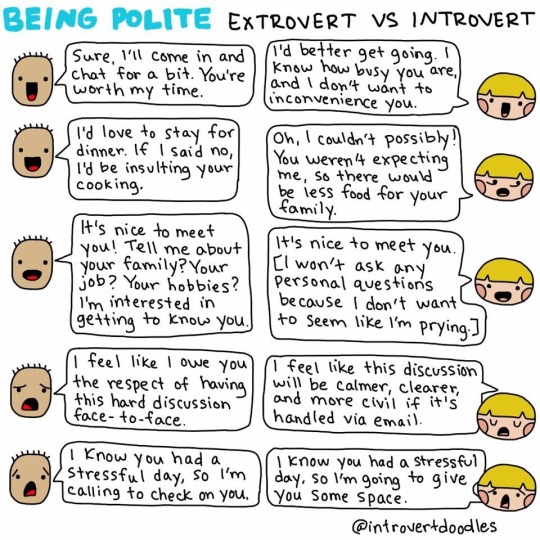
What’s rude to one person, may actually seem considerate to another. Can we stop assuming the worst about people’s motives, and cut each other some slack? #introvert #extrovert From introvertdoodles.com
14K notes
·
View notes
Text
Enneagram and Defense Mechanisms
The following are said to be the key defense mechanisms of each enneagram type. Key Defense Mechanisms: Enneagram 1 - Repression, Reaction Formation, and Displacement
Enneagram 2 - Identification, Reaction Formation, and Denial.
Enneagram 3 - Repression, Projection, and Displacement.
Enneagram 4 - Introjection, Displacement, and Turning against the self.
Enneagram 5 - Displacement, Projection, and Isolation.
Enneagram 6 - Identification, Displacement, and Projection.
Enneagram 7 - Repression, Externalization, and Acting out.
Enneagram 8 - Repression, Displacement, and Denial.
Enneagram 9 - Repression, Dissociation, and Denial.
Here are some brief explanations of these defense mechanisms.
Repression- the psychological attempt made by an individual to direct one’s own desires and impulses toward pleasurable instincts by excluding the desire from one’s consciousness and holding or subduing it in the unconscious.
Reaction Formation- a kind of psychological defense mechanism in which a person perceives their true feelings or desires to be unacceptable, and so they attempt to convince themselves or others that the opposite is true–often in a very exaggerated performance.
Displacement- displacement is when a person shifts his/her impulses from an unacceptable target to a more acceptable or less threatening target.
For example, if you are very angry at your teacher because you did poorly on a test and think the reason for your poor performance is because the teacher asked tricky, unfair questions, you may become angry at your teacher. But, you obviously can’t yell at your teacher (really, you can’t!), hit your teacher, or express your angry in any other hostile way toward the teacher, so you go home and “displace” your anger by punching your little brother instead. Identification- a psychological process whereby the subject assimilates an aspect, property, or attribute of the other and is transformed wholly or partially, by the model that other provides. It is by means of a series of identifications that the personality is constituted and specified.
Denial- a psychological defense mechanism in which confrontation with a personal problem or with reality is avoided by denying the existence of the problem or reality.
Projection- Psychological projection is a defense mechanism people subconsciously employ in order to cope with difficult feelings or emotions. Psychological projection involves projecting undesirable feelings or emotions onto someone else, rather than admitting to or dealing with the unwanted feelings.
The classic example of projection is that of a woman who has been unfaithful to her husband but who accuses her husband of cheating on her.
Turning against the self - a very special form of displacement, where the person becomes their own substitute target. It is normally used in reference to hatred, anger, and aggression, rather than more positive impulses, and it is the explanation for many of our feelings of inferiority, guilt, and depression.
Isolation- It is characterized as a mental process involving the creation of a gap between an unpleasant or threatening cognition, and other thoughts and feelings. By minimizing associative connections with other thoughts, the threatening cognition is remembered less often and is less likely to affect self-esteem or the self concept
The concept is illustrated with the example of a person beginning a train of thought and then pausing for a moment before continuing to a different subject. His theory stated that by inserting an interval the person was “letting it be understood symbolically that he will not allow his thoughts about that impression or activity to come into associative contact with other thoughts.” As a defense against harmful thoughts, isolation prevents the self from allowing these cognitions to become recurrent and possibly damaging to the self-concept. Externalization- an unconscious defense mechanism by which an individual “projects” his or her own internal characteristics onto the outside world, particularly onto other people.
Acting Out- to perform an action in contrast to bearing and managing the impulse to perform it. The acting done is usually anti-social and may take the form of acting on the impulses of an addiction (e.g. drinking, drug taking or shoplifting) or in a means designed (often unconsciously or semi-consciously) to garner attention (e.g. throwing a tantrum or behaving promiscuously).
Dissociation- any of a wide array of experiences from mild detachment from immediate surroundings to more severe detachment from physical and emotional experience. Usually it’s disruptions in aspects of consciousness, identity, memory, physical actions and/or the environment.
And for those anal people that need sources or whatever, these defense mechanisms originate from Freudian Theory. And I got them from Wikipedia and from Psychology Today. The correlation to the types and the defense mechanisms is from the 9types.com website under that tab on the left that says “Understanding E-gram”
2K notes
·
View notes
Text
INFJ: the satanic Ni-Ti loop & escaping its pentagram
i hate Ni-Ti loops. i’m also in one way too often. my fellow INFJs, here’s what happens when you loop and how to (theoretically) thaw the ice in your heart, you frigid bee-yotch you
Reminder that Ni, on its own, can be a remarkably cold function. It thrives on analysis and possibilities. Ni says to the INFJ, “Here is one idea! Here are the infinite ideas that branch off from this singular idea! And here is how they are all related!” Ni hands the INFJ the world, and its possibilities, on a silver platter.
In short, Ni grants the INFJ the ability to look at infinite possibilities. But remember: Ni is a perceiving function, not a judging function. When people say that Ni is always sure of its vision, that’s kind of an incorrect statement, because Ni doesn’t actually do the judging, nor does it produce the INFJ’s vision. Ni does, however, give the INFJ the ability to be sure of their vision, since it lets the INFJ see every possibility and the flaws in each; therefore, the decision of the judging function appears to the INFJ as absolutely correct.
Ni, on its own, is not sure of its vision. That’s a side effect of whatever judging function accompanies it. The judging function produces the vision, which Ni assures the INFJ is the right vision. But really. The judging function’s the one in charge.
In a healthy INFJ, that judging function is usually Fe – kind, friendly, gorgeous Fe. Fe usually is there to wrap Ni in a comfy warm blanket, which is why lots of people don’t immediately recognize Ni’s potential for coldness. When the INFJ relies on Fe to produce their vision, that vision is usually one that wants to help people, as is the nature of Fe. The INFJ looks out for others. They help their friends. They, I don’t know, save the world, save kittens from tree branches, become Jesus or whatever.
(side note: Fe can easily be toxic/unhealthily developed, as I also mentioned in the post I linked before, but that’s not what I’m talking about here)
But! In a loop! We don’t have Fe to produce the vision. We have Ti, the next judging function. Which can be detrimental to the INFJ due to several key differences between Ti and Fe:
First, Ti is introverted. There’s a reason that extroverted judging functions usually accompany introverted perceiving functions (and vice versa). The balance between introversion/extroversion is absolutely critical to any functioning member of society. In a Ni-Ti loop, the INFJ lives entirely in their own head, bypassing their immediate connection to the external world.
Next, the nature of Ti: internal blueprints, assessing new information based on an infrastructure of logic. Ti obviously works wonderfully when in harmony with other functions, but when it interacts with Ni alone, without Fe’s help, Ti uses logic to justify selfishness.
INFJs in a loop are withdrawn and shut people out. When I’ve looped in the past, I completely cut off a close friend who was nothing but wonderful to me, simply because I was busy & our friendship was a lot of work. Not your stereotypical INFJ saint, eh? And the worst part is that toxic Ti’s logic will fool you. It’s hard to get out of a loop because Ti makes the looping make 1000% logical sense. You’ll say to yourself, “Hey, ignoring this person isn’t awful of me, even though she’s going through a lot & needs my friendship. This is just what makes sense. I have to look out for myself.” Wrong! You’re just acting like an asshole. I promise you, I could have handled my shit and also have been a good friend. Ti was just a lot more convenient for me to use in that situation. That’s what I mean by selfishness.
So: You lost your Fe, and Ti’s making all of your decisions, and you don’t like it. You feel trapped in your mind, and often disconnected from your emotions. Likely you feel numb and detached. So what do you do?
THE BAD SOLUTION: When you try to get out of a loop, your first instinct will be to rely on Se, as a way to get out of your head. This is not healthy. If you use Se as a crutch and do not healthily develop it, you will only make things worse. Se will make you overeat or undereat; it will make you sleep too much or too little; you will do dumb self-destructive things and drink too much and maybe even have sex you’ll regret later. Please practice Se responsibility. Like they say in vodka commercials.
THE REAL SOLUTION: Develop your Fe, god damn it. Do random acts of kindness and make up with that friend you’ve been ignoring. Go outside. Feel grass in between your toes and sun on your skin and be inspired to love. I promise you, sending one text to one person with the pure intention of brightening their day will help you out. Practice the good qualities of Fe: empathy, kindness, and understanding. I promise things will work out.
776 notes
·
View notes

